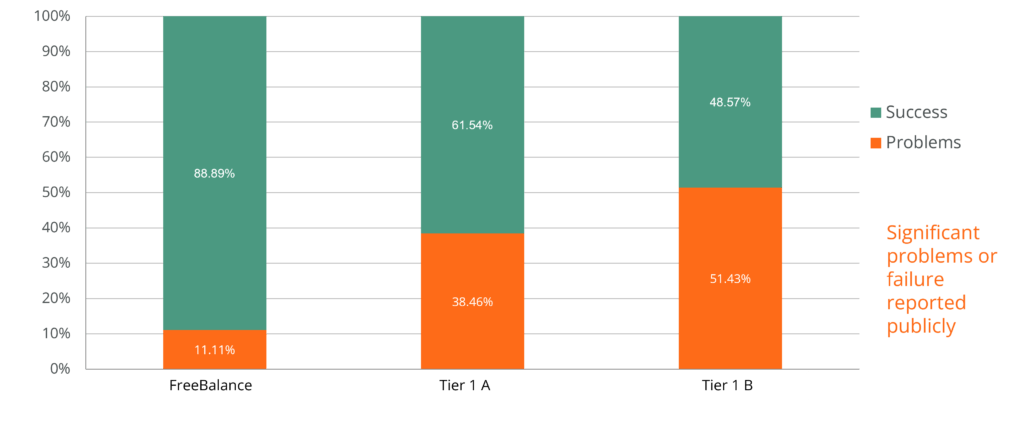Why ERP Doesn’t Work for Public Financial Management
Governments around the world have been trying to implement Enterprise Resource Planning (ERP) software, but with low success rates. Could this be because ERP was originally designed for the private sector? And because they use generic methodologies? We think so.
FreeBalance has been implementing Government Resource Planning (GRP) software around the world for almost 40 years and we have seen first hand how governments struggle to deal with rich, but irrelevant, ERP feature sets. So-called built-in “best practices” are rarely applicable in Public Financial Management (PFM) and can’t be implemented with existing public service capabilities. Even when built-in practices are relevant, PFM legal reform is usually required.
Why GRP Is Better For Public Financial Management
GRP, on the other hand, was designed exclusively for government. In our case, the FreeBalance Accountability Suite™, has only been implemented in the public sector. And, our proprietary A-i3+qM implementation methodology which we have developed over the last 30 years captures all of our GRP implementation experience.
Let’s face it, the public sector is very different from the private sector. FreeBalance’s deep specialization in government and PFM helps to make our implementations more successful and sustainable than alternatives.
Here are our top reasons why GRP is better than ERP for Public Financial Management:
Product Design Relevance
Governments whose Integrated Financial Management Systems (IFMIS) use GRP systems from vendors who are also responsible for implementation, benefit from the vendor’s experience. This implementation experience also helps vendors to prioritize new product modules and features applicable to the public sector. In addition, because these vendors are committed to meeting government’s requirements, implementing improvements to existing modules is not an issue. Lastly, the direct engagement such vendors have with governments and the international PFM community helps to identify future needs.
For example, all FreeBalance customers are invited to join the FreeBalance International Steering Committee (FISC) which provides input into the our services and product roadmap and helps to set our development priorities.
Questions to ask your IFMIS vendor: how do they embed implementation experience into product design?
Implementation Efficiency
Government-specific software results in faster implementations through highly no-code / low-code configuration to reduce code customization. Specialized tools and templates improve the productivity of expert consultants. And, there is no unnecessary private sector functions to eliminate.
For example, FreeBalance’s A-i3+qM implementation methodology leverages agile techniques to deliver working GRP software within six months. In addition, our software costs an average 225% less than Tier 1 ERP providers as shown in this analysis of the five year total cost of ownership including software, middleware, implementation, training and support, and in some situations, servers.
Questions to ask your IFMIS vendor: can they accelerate implementations to get faster time-to-results?
Implementation Success
Government specialization enables implementation teams to deliver on time and on budget. Most importantly, the result more likely meets original project objectives. FreeBalance’s implementations are proven to be more successful than Tier 1 ERP providers.

For example, our A-i3+qM methodology includes tools to validate implementation design, and organizational change management and government capacity building built into our roll outs.
Questions to ask your IFMIS vendor: how will they achieve project objectives and go beyond stated requirements?
Future Sustainability
Government specialization also improves affordability post implementation. Government-specific software requires far less management and maintenance than ERP. Low-code / no-code configuration enables governments to adapt software easily to support future reform and modernization. Configuration is not code customization.
For example, FreeBalance purpose-led mandate of improving citizen wellbeing and combating corruption means that we are committed to ensuring that a country’s PFM investments are sustainable.

Questions to ask your IFMIS vendor: how can their software be maintained inexpensively? How will their software adapt to meet future reforms? Where it has been done before, and how does their product support the typical next generation of needs?
Conclusions
The value of public finance specific software cannot be understated. The benefits of using such a solution – including faster implementation timelines, greater success rates, more sustainable results, and better capacity building – make it an essential solution for any finance ministry.
Get in touch today to discuss how the FreeBalance Accountability Suite™ could meet your PFM requirements.

